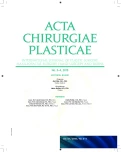A-11 Anesthesia and recurrence of malignant melanoma
Authors:
O. Šedivý 1,2; A. Fibír 1,2; I. Slaninka 1,2
Authors‘ workplace:
University Hospital Hradec Králové, Department of Plastic and Aesthetic Surgery and Burns, Hradec Králové, Czech Republic
1; Charles University in Prague, Medical Faculty in Hradec Králové, Hradec Králové, Czech Republic
2
Published in:
ACTA CHIRURGIAE PLASTICAE, 57, 3-4, 2015, pp. 62
Category:
Selected abstracts from the 36th national congress of the czech society plastic surgery with international participation
Cutaneous malignant melanoma is a malignant tumor, the incidence of which still increases. There is no doubt that the most effective treatment option is its early wide excision with sufficient resection margins. Surgical procedures are performed under local, regional or general anesthesia with regards to the extent of the procedure and localization of the primary lesion. We came up with a question whether the chosen type of anesthesia could have some effect on the result of therapy and recurrence of the disease. We performed a detailed review of published papers from 1980, which deal with this topic.
It has been shown that most papers disprove the previous myth about contraindication of local anesthesia in malignant melanoma surgery and suggest rather the opposite. According to the review papers concerning the effect of general anesthesia on immune system, it is obvious that standardly used anesthetics and opiates have a negative effect on the most important component of cellular immunity, which contributes on elimination of tumor cells and NK cells and cytotoxic T lymphocytes. These pharmaceuticals negatively influence the overall number and activity of these components of cell immunity and reduce the possibility to eliminate circulating tumor cells, which a healthy immune system is able to eliminate. The presentation dealing with the effect of local anesthesia provides further interesting results in lidocaine, in which is demonstrated in vitro suppression of proliferation of tumor cells and in ropivacaine, where in vitro occurs suppression of cell growth of large bowel carcinoma. The most interesting papers about the effect of anesthesia on the course of malignant melanoma include the study of German authors, who statistically demonstrated a significantly higher 10 year survival in 4329 patients with malignant melanoma operated under local anesthesia (85%) compared with patients operated under general anesthesia (79%).
Our findings have shown that chosen type of anesthesia during the surgical procedure in malignant melanoma could have an effect on recurrence of malignant melanoma, however different to what was previously assumed. It has been shown that usage of local or regional anesthesia could reduce recurrence of malignant melanoma. These results should be however supported with other, preferably prospective studies.
Sources
1. Schlagenhauff B et al. Prognostic impact of the type of anaesthesia used during the excision of primary cutaneous melanoma. Melanoma Res. 2000;10 : 165–9.
2. Snyder GL, Greenberg S. Effect of anaesthetic technique and other perioperative factors on cancer recurrence. Br J Anaesth. 2010 Aug; 105(2):106–115 .
Labels
Plastic surgery Orthopaedics Burns medicine TraumatologyArticle was published in
Acta chirurgiae plasticae

2015 Issue 3-4
- Possibilities of Using Metamizole in the Treatment of Acute Primary Headaches
- Metamizole at a Glance and in Practice – Effective Non-Opioid Analgesic for All Ages
- Metamizole vs. Tramadol in Postoperative Analgesia
- Spasmolytic Effect of Metamizole
- Safety and Tolerance of Metamizole in Postoperative Analgesia in Children
-
All articles in this issue
- Editorial
- 36th NATIONAL CONGRESS OF THE CZECH SOCIETY OF PLASTIC SURGERY WITH INTERNATIONAL PARTICIPATION
- A-01 RECONSTRUCTION OF DEFECTS WITH FOREHEAD FLAP
- A-02 SUBMENTAL AND SUPRACLAVICULAR FLAP
- A-03 “Facial Makeover” – new usage of orthognatHic surgery to improve aesthetics of the face
- A-04 Use of 3D planning in primary microsurgical reconstruction of a facial defect
- A-05 LID IMPLANTS IN THE THERAPY OF LAGOPHTHALMUS
- A-06 COMPARISON OF ERYTHROCYTE, LEUKOCYTE AND PROGENITOR CELLS COUNT IN LIPOASPIRATE COLLECTED USING VARIOUS LIPOSUCTION TECHNIQUES
- A-07 Allogenous acellular dermal matrix in breast reconstruction – our experiences
- A-08 Use of NPWT during reconstructive procedures in plastic surgery
- A-09 Plasmatherapy in chronic skin defects – results of a prospective study
- A-10 Reconstruction of traumatic defects of distal third of the calf with a fasciocutaneous sural flap – our experience
- A-11 Anesthesia and recurrence of malignant melanoma
- A-12 Low osteoplastic amputation of the calf using vascularized bone graf
- A-13 BARRIER EFFICIENCY OF POLYURETHANE FOIL IN PREVENTION OF POSTOPERATIVE INFECTION IN FREE MUSCLE FLAPS
- A-14 SSM WITH IMPLANT RECONSTRUCTION
- A-15 PATIENT SATISFACTION AFTER TWO STAGE IMMEDIATE BREAST RECONSTRUCTION – RETROSPECTIVE STUDY
- A-16 COMPLICATION OF IMMEDIATE TWO STAGE BREAST RECONSTRUCTION AFTER MASTECTOMY
- A-17 Primary breast reconstruction with an implant
- A-18 Two methods to improve vascular supply of a DIEP flap
- Dorsoradial forearm flap with silicone bone spacer in reconstruction of A combined THUMB injury – case report
-
ZORA JANŽEKOVIČ
(September 30, 1918 – March 17, 2015) - Index
- Acta chirurgiae plasticae
- Journal archive
- Current issue
- About the journal
Most read in this issue
- 36th NATIONAL CONGRESS OF THE CZECH SOCIETY OF PLASTIC SURGERY WITH INTERNATIONAL PARTICIPATION
-
ZORA JANŽEKOVIČ
(September 30, 1918 – March 17, 2015) - Dorsoradial forearm flap with silicone bone spacer in reconstruction of A combined THUMB injury – case report
- Editorial
